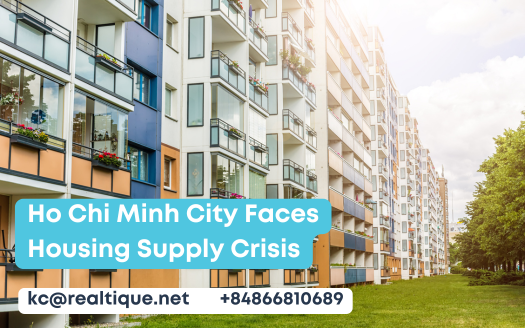Ho Chi Minh City Faces Housing Supply Crisis
Ho Chi Minh City, a crucial economic hub of Vietnam, is presently confronting a significant housing supply crisis. With a mere 20% of the estimated 40,000 new apartments scheduled for nationwide delivery anticipated to reach the city in the forthcoming year, the city’s housing framework is under considerable strain. This shortfall is set to intensify due to persistent regulatory obstacles and development delays, further fueling the demand for an estimated additional 11,000 apartments by 2026. This situation warrants a thoughtful exploration into the factors contributing to this supply-demand imbalance and the potential implications on the city’s economic significance.
Table of Contents
Supply Forecast for Ho Chi Minh City
Facing the imminent reality of a housing supply crisis, Ho Chi Minh City is expected to account for only 20% of the forecasted 40,000 new apartments nationwide by next year.
This city, being an economic hub, is anticipated to face ongoing supply constraints until 2026, exacerbating the housing crisis. An additional 11,000 new apartments are expected to enter the market by 2026, yet uncertainties cloud this projection due to regulatory challenges and project delays.
Market fluctuations indicate a cyclical pattern with a 10-year span, with 2024 expected to be a transitional year due to impending legal reforms.
The supply forecast for Ho Chi Minh City is a critical factor to consider, as it directly impacts the housing affordability and overall economic development.
Market Dynamics and Trends
How will market fluctuations and trends shape the future of Ho Chi Minh City’s housing environment? As Vietnam’s economic hub, the city’s housing market is significantly influenced by broader economic trends and policy changes. A key trend is the rising demand for high-end housing. This, combined with the existing supply constraints, is expected to increase prices, particularly in the luxury segment. Meanwhile, the city is nearing saturation, with limited options for affordable housing. The table below provides a snapshot of these market movements and trends.
| Market Movements | Impact on Housing Prices | Forecasted Trends |
|---|---|---|
| Rising Demand | Increase in Prices | Continual Rise |
| Supply Constraints | Increase in Prices | Persistence till 2026 |
| Market Saturation | Limited Affordable Options | Near Saturation |
Regulatory Challenges and Delays
While the market forces illustrate an image of rising demand and limited supply, the regulatory environment adds another layer of complexity to Ho Chi Minh City’s housing situation.
The current legal structure often complicates project approvals and extends development timelines, leading to average project completion delays of one to two years. This procedural congestion results in numerous projects still awaiting resolution in various legal stages.
Although new laws have been introduced to streamline project approvals, they require a substantial period for effective implementation. Out of 64 projects, 34 have been resolved, while 21 remain under review.
This regulatory hurdle underlines the challenges in swiftly addressing the city’s housing crisis, further delaying the delivery of much-needed residential units.
Economic Impact and Housing Affordability
Despite the ongoing regulatory challenges, the economic impact of the housing supply crisis in Ho Chi Minh City cannot be overstated. Rising housing prices are putting significant pressure on living standards and impeding sustainable economic growth.
The average income for high-level professionals in the city is approximately 20 million VND per month, yet housing prices in suburban areas have surged to 55-65 million VND per square meter. This economic disparity may force workers to seek housing in less desirable areas, exacerbating social inequality.
In addition, potential labor shortages could arise as workers struggle to afford housing, which could detrimentally impact the overall economic development of the city. Hence, the housing affordability issue is not just a social concern but a critical economic challenge.
Strategic Solutions and Recommendations
Addressing the housing supply crisis in Ho Chi Minh City necessitates strategic and complex solutions. The city plans to form task forces to expedite housing projects and alleviate supply constraints. Collaboration between the government and the private sector is essential to craft innovative and sustainable solutions.
In light of the current crisis, businesses are urged to reassess their strategies and adapt to changing market conditions. A significant focus should be placed on affordable housing projects to cater to the growing demand. Ultimately, long-term strategies are required to guarantee sustainable urban development.
| Strategy | Description | Expected Impact |
|---|---|---|
| Form Task Forces | Speed up housing projects | Increase housing supply |
| Public-Private Collaboration | Innovative solutions | Sustainable housing |
| Business Strategy Reassessment | Adapt to market changes | Satisfy fluctuating demand |
| Affordable Housing Focus | Cater to growing demand | Improve housing affordability |
| Long-term Strategies | Secure future development | Sustainable urban growth |





